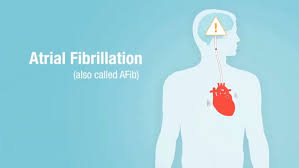General Health Tips & News
Atrial Fibrillation: Unraveling the Irregular Beat of the Heart
By A.S. (staff writer) , published on August 31, 2023

Medicine Telehealth Health
Introduction
The heart, with its rhythmic and synchronized beats, is a remarkable organ that tirelessly pumps blood throughout our bodies. This continuous circulation of oxygenated blood ensures our cells and organs receive the vital nutrients they need to function correctly. However, the heart's rhythm can sometimes go awry, and one of the most prevalent arrhythmias is atrial fibrillation (AFib). In this comprehensive article, we delve into the intricacies of AFib, exploring its causes, symptoms, complications, diagnosis, treatment, and lifestyle modifications that can help manage this common heart condition.
Understanding Atrial Fibrillation (AFib)
Atrial fibrillation, often referred to as AFib is a cardiac arrhythmia characterized by irregular and rapid heartbeats. Instead of the heart's upper chambers (atria) contracting in a coordinated manner, they quiver or fibrillate. This chaotic activity disrupts the heart's normal rhythm and can lead to various health concerns.
Prevalence and Risk Factors
AFib is the most common sustained cardiac arrhythmia worldwide, affecting millions of people. It tends to be more prevalent in older adults, but it can occur at any age. Several factors increase the risk of developing AFib, including:
-
Age: The risk of AFib increases with age, particularly after the age of 60.
-
Heart Disease: Conditions such as hypertension (high blood pressure), coronary artery disease, and heart valve disorders can raise the likelihood of AFib.
-
Obesity: Excess weight can strain the heart and increase the risk of AFib.
-
Diabetes: Poorly controlled diabetes is a risk factor for AFib.
-
Lifestyle Choices: Smoking, excessive alcohol consumption, and illicit drug use can contribute to the development of AFib.
-
Family History: A family history of AFib may increase an individual's risk.
Symptoms of AFib
The symptoms of AFib can vary from person to person and may include:
-
Palpitations: A rapid, irregular heartbeat, often described as fluttering or pounding in the chest.
-
Fatigue: Unexplained tiredness, even with minimal exertion.
-
Shortness of Breath: Difficulty breathing, especially during physical activity or while lying flat.
-
Dizziness or Lightheadedness: A feeling of unsteadiness or a tendency to faint.
-
Chest Discomfort: Some individuals may experience chest pain or pressure, often mistaken for a heart attack.
It's essential to note that some individuals with AFib may not experience any noticeable symptoms, making regular check-ups and screenings critical, especially for those at higher risk.
Complications of AFib
AFib can lead to several serious complications, including:
-
Stroke: AFib increases the risk of blood clots forming in the atria, which can travel to the brain and cause a stroke.
-
Heart Failure: The irregular rhythm of AFib can weaken the heart over time, potentially leading to heart failure.
-
Chronic Fatigue: Persistent fatigue can significantly impact an individual's quality of life.
Diagnosis and Evaluation
Diagnosing AFib typically involves the following steps:
-
Medical History: Your healthcare provider will review your medical history and assess your risk factors.
-
Physical Examination: A physical examination, including checking your pulse and blood pressure, can provide initial clues.
-
Electrocardiogram (ECG or EKG): An ECG records the heart's electrical activity, identifying irregularities characteristic of AFib.
-
Holter Monitor: For intermittent or infrequent AFib, a portable ECG device known as a Holter monitor may be worn for an extended period to capture episodes.
-
Blood Tests: Blood tests may be conducted to assess thyroid function and rule out other conditions.
Treatment and Management
Treatment strategies for AFib aim to:
-
Restore Normal Rhythm: This can be achieved through cardioversion, a procedure involving electrical shock or medication.
-
Control Heart Rate: Medications such as beta-blockers or calcium channel blockers may be prescribed to slow the heart rate.
-
Prevent Blood Clots: Anticoagulant medications are often recommended to reduce the risk of stroke.
-
Manage Underlying Conditions: Addressing conditions like hypertension or heart disease can help control AFib.
-
Ablation Therapy: In certain cases, catheter ablation may be performed to target and eliminate the abnormal electrical pathways in the heart.
Lifestyle Modifications
In addition to medical treatment, lifestyle changes can play a pivotal role in managing AFib:
-
Healthy Diet: Maintain a diet rich in fruits, vegetables, lean proteins, and whole grains while limiting salt and saturated fats.
-
Regular Exercise: Engage in regular, moderate-intensity exercise with your healthcare provider's guidance.
-
Limit Alcohol and Caffeine: Excessive consumption of alcohol and caffeine can trigger AFib episodes.
-
Stress Management: Adopt stress-reduction techniques such as meditation, yoga, or deep breathing exercises.
-
Smoking Cessation: Quitting smoking is essential for overall cardiovascular health.
Conclusion
Atrial fibrillation is a common cardiac arrhythmia that requires careful management to prevent complications and improve the quality of life. With a combination of medical treatment, lifestyle modifications, and regular monitoring, individuals with AFib can lead fulfilling lives while reducing their risk of stroke and other associated health issues. It's essential to work closely with healthcare providers to create a personalized treatment plan tailored to individual needs and circumstances. Early diagnosis and proactive management are key to effectively controlling this irregular beat of the heart.
References
What Is Atrial Fibrillation? (2022, November 30). Retrieved from NIH: https://www.nhlbi.nih.gov/health/atrial-fibrillation
What is Atrial Fibrillation? (2023, March 23). Retrieved from American Heart Association: https://www.heart.org/en/health-topics/atrial-fibrillation/what-is-atrial-fibrillation-afib-or-af
Find articles related to: Medicine Telehealth Health
More articles about General Health Tips & News
Back to the Health Tips Index




